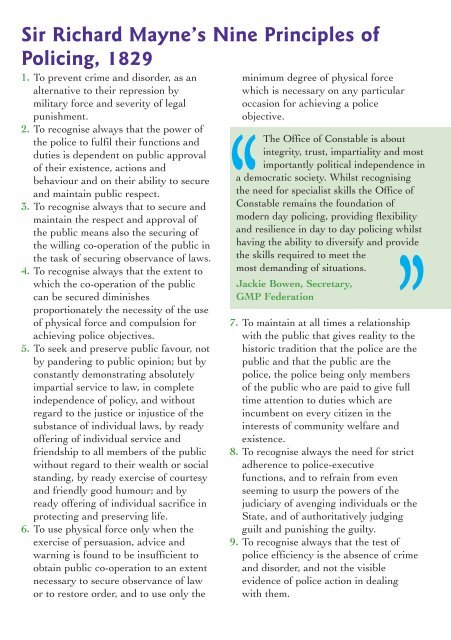The Office of Constable - Police Federation
The Office of Constable - Police Federation
The Office of Constable - Police Federation
Create successful ePaper yourself
Turn your PDF publications into a flip-book with our unique Google optimized e-Paper software.
Sir Richard Mayne’s Nine Principles <strong>of</strong><br />
Policing, 1829<br />
1. To prevent crime and disorder, as an<br />
alternative to their repression by<br />
military force and severity <strong>of</strong> legal<br />
punishment.<br />
2. To recognise always that the power <strong>of</strong><br />
the police to fulfil their functions and<br />
duties is dependent on public approval<br />
<strong>of</strong> their existence, actions and<br />
behaviour and on their ability to secure<br />
and maintain public respect.<br />
3. To recognise always that to secure and<br />
maintain the respect and approval <strong>of</strong><br />
the public means also the securing <strong>of</strong><br />
the willing co-operation <strong>of</strong> the public in<br />
the task <strong>of</strong> securing observance <strong>of</strong> laws.<br />
4. To recognise always that the extent to<br />
which the co-operation <strong>of</strong> the public<br />
can be secured diminishes<br />
proportionately the necessity <strong>of</strong> the use<br />
<strong>of</strong> physical force and compulsion for<br />
achieving police objectives.<br />
5. To seek and preserve public favour, not<br />
by pandering to public opinion; but by<br />
constantly demonstrating absolutely<br />
impartial service to law, in complete<br />
independence <strong>of</strong> policy, and without<br />
regard to the justice or injustice <strong>of</strong> the<br />
substance <strong>of</strong> individual laws, by ready<br />
<strong>of</strong>fering <strong>of</strong> individual service and<br />
friendship to all members <strong>of</strong> the public<br />
without regard to their wealth or social<br />
standing, by ready exercise <strong>of</strong> courtesy<br />
and friendly good humour; and by<br />
ready <strong>of</strong>fering <strong>of</strong> individual sacrifice in<br />
protecting and preserving life.<br />
6. To use physical force only when the<br />
exercise <strong>of</strong> persuasion, advice and<br />
warning is found to be insufficient to<br />
obtain public co-operation to an extent<br />
necessary to secure observance <strong>of</strong> law<br />
or to restore order, and to use only the<br />
minimum degree <strong>of</strong> physical force<br />
which is necessary on any particular<br />
occasion for achieving a police<br />
objective.<br />
“<br />
<strong>The</strong> <strong>Office</strong> <strong>of</strong> <strong>Constable</strong> is about<br />
integrity, trust, impartiality and most<br />
importantly political independence in<br />
a democratic society. Whilst recognising<br />
the need for specialist skills the <strong>Office</strong> <strong>of</strong><br />
<strong>Constable</strong> remains the foundation <strong>of</strong><br />
modern day policing, providing flexibility<br />
and resilience in day to day policing whilst<br />
having the ability to diversify and provide<br />
the skills required to meet the<br />
”<br />
most demanding <strong>of</strong> situations.<br />
Jackie Bowen, Secretary,<br />
GMP <strong>Federation</strong><br />
7. To maintain at all times a relationship<br />
with the public that gives reality to the<br />
historic tradition that the police are the<br />
public and that the public are the<br />
police, the police being only members<br />
<strong>of</strong> the public who are paid to give full<br />
time attention to duties which are<br />
incumbent on every citizen in the<br />
interests <strong>of</strong> community welfare and<br />
existence.<br />
8. To recognise always the need for strict<br />
adherence to police-executive<br />
functions, and to refrain from even<br />
seeming to usurp the powers <strong>of</strong> the<br />
judiciary <strong>of</strong> avenging individuals or the<br />
State, and <strong>of</strong> authoritatively judging<br />
guilt and punishing the guilty.<br />
9. To recognise always that the test <strong>of</strong><br />
police efficiency is the absence <strong>of</strong> crime<br />
and disorder, and not the visible<br />
evidence <strong>of</strong> police action in dealing<br />
with them.
















